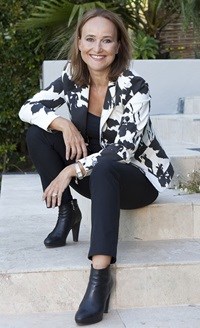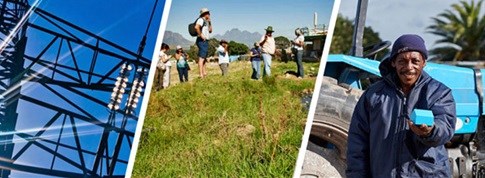
Top stories






More news






ESG & Sustainability
#Sona2026: President announces crisis committee to tackle SA's water challenges







The reason? Well, 2014's well and truly bitten the dust, but the design focus that came to our shores with it is intended to reap rewards for years to come.
It's a similar sentiment to what you'll find in the thinking behind the #cocreatesa fund, which offers R500,000 to projects that aim to combine Dutch and South African knowledge, that seek innovative solutions to local challenges and involve the sectors of agriculture and food, energy, life sciences and health, logistics and water.

Just the latest example of how Dutch design thinking is transforming South Africa for the better, I chatted to Bonnie Horbach, the Consul General of the Kingdom of the Netherlands in Cape Town and initiator of the fund to find out how we can all benefit from the hashtag and its second call to action...
 1. What is your average day like, as Consul General of the Kingdom of the Netherlands in Cape Town?
1. What is your average day like, as Consul General of the Kingdom of the Netherlands in Cape Town?Horbach: For the most part, it's taken up by meetings. Lots of companies in the Netherlands are looking to invest in the Western Cape, and to find out specifics about the investment climates and risks of doing so. I also meet with new local contacts, ranging from government to Cape-based businesses to build up my own network. So that results in about five meetings or presentations per day. In addition, my inbox is always full, I attend three to four evening events per week and I'm a single mother, so I really do try to balance it all - but I love it.
 2. Give us a little more insight into the Open Call that kicked off late last week- what's response been like so far?
2. Give us a little more insight into the Open Call that kicked off late last week- what's response been like so far?Horbach: So far it's been great with many media showing interest, I've spoken about the Open Call on CNBC Africa, Smile FM and Cape Talk. The conversation with Cape Talk's Kieno Kammies is embedded below. Lots of South African organisations and businesses are keen to find out more, and they have until 1 June to send in their proposals.
 3. Explain the origins of the #cocreatesa hashtag - how did you come up with the concept, what is the intended outcome, and what is the link back to WDC2014?
3. Explain the origins of the #cocreatesa hashtag - how did you come up with the concept, what is the intended outcome, and what is the link back to WDC2014?Horbach: Well, the Netherlands is run on modern economic diplomacy, which to me means three things - it's based on establishing relationships, for the long term, and is usually demand-driven. Back in July 2013, my first meeting was for the WDC planning. We started off with the year-long plan but wanted to extend it beyond just 12 months as the long-term aspect is crucial. I also wanted it to be more than just the Netherlands bringing Dutch ideas on where and how to connect people to get the most out of the various partnerships. We need to use those ties to cocreate. That leads us to the hashtag - my communication partner at the time added the 'SA' to my initial 'cocreate' to make it local, as it's a nationwide concept, by no means limited to Cape Town. Now, it's about growing nationally and doing business together, not just about pushing ideas from one nation to another. This is becoming a global trend.
Cape Town's World Design Capital 2014 status created a good platform for growing longer term relationships. Last year, we funded nine projects in the first Open Call, and that proved it's a great way to kick-start long-term relationships between South Africa and Dutch partners, and the fact that it comes from mutually beneficial relationships means it's more sustainable, with positive economic repercussions.
 4. Why is design such an important aspect for all business?
4. Why is design such an important aspect for all business?Horbach: Design is ultimately in everything we do. It is a method with which we can create solutions. Our focus is not so much on beautiful things, it's on design thinking. A new and innovative way of looking at our challenges, such as finding a better way to use our electricity supply. It's about getting the right brains and expertise together and involving not just experts in a specific field but also those who are in need of the service to look at all elements of the challenge together.. It's about thinking out of the box, connecting different disciplines with new ideas resulting from the input of many masterminds.
 5. What are the criteria to be deemed a worthy 'Dutch-SA' project?
5. What are the criteria to be deemed a worthy 'Dutch-SA' project?Horbach: It simply needs to be a South African business or organisation that connects to a Dutch partner, working together to find a solution to a South African challenge that's demand driven, sustainable and can be based on any topic, such as access to water or reliable energy or improving health care in the country. It just needs to be collaborative and based on solving an issue. The scope is very broad. Ultimately, it's a way to design your future as design is used in all sectors, as is innovation. If you've already come up with an idea and just need the funding to run a pilot project, this is also an opportunity for you. Take for example the idea for small-scale farmers to grow flowers using Dutch expertise. South Africa has a great climate for this and flowers are quite pricey here, so this would be a good match.

If you have a small-scale idea with big potential, put it forward. Anything that will improve our experiences and build on the Dutch-South African relationship is fair game, provided there is a clear challenge you're addressing from a South African point of view.
 6. Is there any limit on how the prize money may be used?
6. Is there any limit on how the prize money may be used?Horbach: There's no limit. You'll need a solid budget and to pay 50% of the costs yourself, but apart from that it's fair game. We'll donate up to R100,000 for a proposal, and all of these will be judged on their merit by a local committee on 25 June to see the proposal's full potential, because who has more knowledge on what South Africa needs than South Africans?
Horbach concludes: "With the new round of funding, I again hope to inspire and spark innovative thinkers and doers from South Africa and the Netherlands to reach out to each other, share ideas, partner up and create the solutions that will work in South Africa."
Submissions for this year's #cocreateSA Fund can be made until 1 June 2015. For more information on the application process and requirements, please visit www.cocreatesa.co.za and keep an eye on the official #cocreateSA Facebook page.
